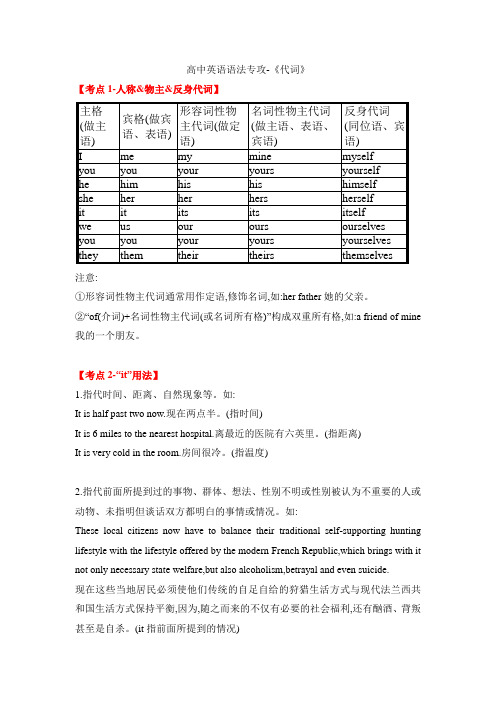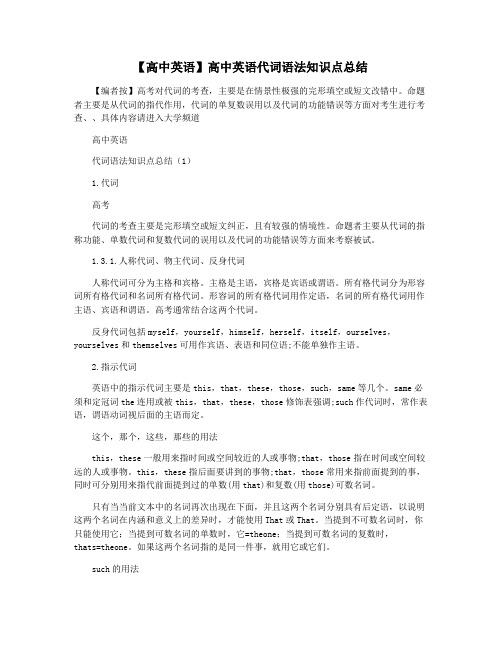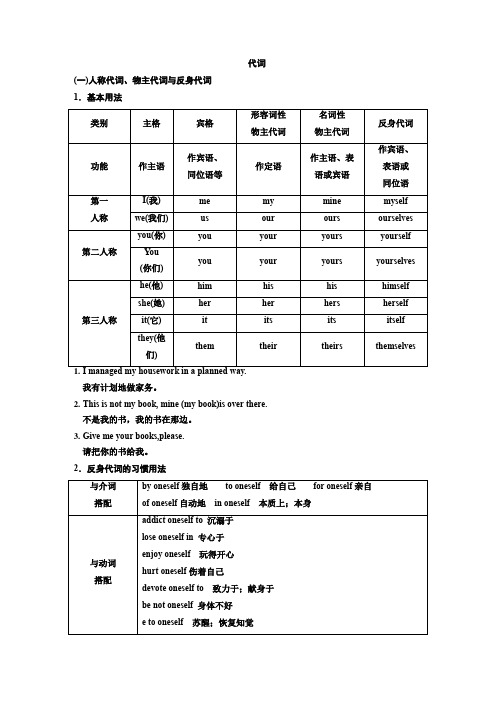高考英语语法总结:代词(一)
高考英语语法专攻-《代词》-考点归纳+针对性练习

高中英语语法专攻-《代词》【考点1-人称&物主&反身代词】注意:①形容词性物主代词通常用作定语,修饰名词,如:her father她的父亲。
②“of(介词)+名词性物主代词(或名词所有格)”构成双重所有格,如:a friend of mine 我的一个朋友。
【考点2-“it”用法】1.指代时间、距离、自然现象等。
如:It is half past two now.现在两点半。
(指时间)It is 6 miles to the nearest hospital.离最近的医院有六英里。
(指距离)It is very cold in the room.房间很冷。
(指温度)2.指代前面所提到过的事物、群体、想法、性别不明或性别被认为不重要的人或动物、未指明但谈话双方都明白的事情或情况。
如:These local citizens now have to balance their traditional self-supporting hunting lifestyle with the lifestyle offered by the modern French Republic,which brings with it not only necessary state welfare,but also alcoholism,betrayal and even suicide.现在这些当地居民必须使他们传统的自足自给的狩猎生活方式与现代法兰西共和国生活方式保持平衡,因为,随之而来的不仅有必要的社会福利,还有酗酒、背叛甚至是自杀。
(it指前面所提到的情况)—Who’s that at the door?—It is the milkman.——门口那人是谁?——是送奶工。
(it指代性别不明或性别被认为不重要的人)—I’ve broken a plate.我打碎了一个盘子。
—It(=Breaking the plate) doesn’t matter.没关系。
高考英语代词知识点总结

高考英语代词知识点总结在高考英语中,代词是一个非常重要的语法知识点。
代词在句子中可以替代名词,起到简化句子结构、避免重复的作用。
本文将从不同角度总结高考英语中的代词知识点。
一、人称代词人称代词是用来代替人的名词的词语。
在高考英语中,常见的人称代词有I、you、he、she、we、they等。
在使用人称代词时需要注意其主格和宾格的区别。
主格用于做主语或表语,而宾格则用于做动词或介词的宾语。
例如:I am a student. (主格)She is taller than me. (宾格)除了区分主格和宾格之外,人称代词还有复数形式。
例如:we代表“我们”,they代表“他们”。
二、物主代词物主代词用来表示所属关系,包括形容词性物主代词和名词性物主代词。
形容词性物主代词位于名词前面修饰名词,而名词性物主代词则作为名词的替代词使用。
例如:This is my book. (形容词性物主代词)The red one is mine. (名词性物主代词)在使用物主代词时,需要根据名词的单复数和所有格进行变化。
例如,单数名词后加's,复数名词只加'。
三、反身代词反身代词用来指示动作的承受者与动作的发出者是同一个人。
常见的反身代词有myself、yourself、himself、herself、ourselves、themselves等。
例如:He hurt himself while playing football. (他在踢足球时受伤了)另外,反身代词可以用来强调主语:I myself will finish the task. (我自己会完成这个任务)四、指示代词指示代词用来指示人或物的位置、距离和数量等信息。
常用的指示代词有this、that、these、those等。
例如:This is my bag. (这是我的包)Those are my friends. (那些是我的朋友)指示代词还可以与名词连用来修饰名词,表示特指。
【高中英语】高中英语代词语法知识点总结

【高中英语】高中英语代词语法知识点总结【编者按】高考对代词的考查,主要是在情景性极强的完形填空或短文改错中。
命题者主要是从代词的指代作用,代词的单复数误用以及代词的功能错误等方面对考生进行考查、、具体内容请进入大学频道高中英语代词语法知识点总结(1)1.代词高考代词的考查主要是完形填空或短文纠正,且有较强的情境性。
命题者主要从代词的指称功能、单数代词和复数代词的误用以及代词的功能错误等方面来考察被试。
1.3.1.人称代词、物主代词、反身代词人称代词可分为主格和宾格。
主格是主语,宾格是宾语或谓语。
所有格代词分为形容词所有格代词和名词所有格代词。
形容词的所有格代词用作定语,名词的所有格代词用作主语、宾语和谓语。
高考通常结合这两个代词。
反身代词包括myself,yourself,himself,herself,itself,ourselves,yourselves和themselves可用作宾语、表语和同位语;不能单独作主语。
2.指示代词英语中的指示代词主要是this,that,these,those,such,same等几个。
same必须和定冠词the连用或被this,that,these,those修饰表强调;such作代词时,常作表语,谓语动词视后面的主语而定。
这个,那个,这些,那些的用法this,these一般用来指时间或空间较近的人或事物;that,those指在时间或空间较远的人或事物。
this,these指后面要讲到的事物;that,those常用来指前面提到的事,同时可分别用来指代前面提到过的单数(用that)和复数(用those)可数名词。
只有当当前文本中的名词再次出现在下面,并且这两个名词分别具有后定语,以说明这两个名词在内涵和意义上的差异时,才能使用That或That。
当提到不可数名词时,你只能使用它;当提到可数名词的单数时,它=theone;当提到可数名词的复数时,thats=theone。
高考英语语法知识总结代词

高考英语语法知识总结(代词)如下:代词在近几年高考试题中的复现率为100%,每年至少测试一道题。
测试代词常用对话形式,构成特定语境,考查考生灵活运用代词的能力。
代词指代的范围、作主语时主谓一致的用法、易混不定代词的细微差别都是高考的必考点。
其中不定代词one,the one,ones与that,those,it的用法区别。
考点一、考查one(s), that, those, it的用法[考点解读]● one泛指一个人或物。其复数形式为ones。 one和the one作同位语时,如果与其同位的词语是特指,则用the one;如果是泛指,则用one,。● that指代前面提到过的名词,常有后置定语。 that的复数形式是those。 that可指代单数可数名词(= the one), 也可指代不可数名词,或指代前面提到过的一件事。● it可指代前面提到过的一个名词,如例7;指代一件事,如例8;指代不明性别的婴儿或不明确的人,也可指代时间、天气、距离等0。二、考查all, both, either, neither, none, no one的用法[考点解读]● both表示“两个人或物都”,具有肯定含义; either表示“两者中任何一个”,如例13; neither表示“两者都不”。● all表示“全部”,指三者或三者以上的人或物,;all也可笼统地表示“一切,所有”, none表示“三者或三者以上的人或物的全部否定”,在与of连用或回答how many/much的提问时只能用none, no one表示“没有一个人”,三、考查another, the other, others, the others的用法[考点解读]● another泛指三个或三个以上的人或物中不确定的另一个,如例19。another还可以作形容词,表示“另一个的”● the other指已知的两个人或物中的另一个● others和“other + 名词”均泛指“别的人或物”● the others指“一定范围内其余的人或物”,如例23。如果被指代的名词是不可数名词,则用the rest替代,四、考查(a) little, (a) few, some, any的用法[考点解读]● few和little可用作代词和形容词。 few和a few可以修饰或代替可数名词复数。 few有否定含义, a few有肯定含义, little和a little可以修饰或代替不可数名词。 little有否定含义, a little含肯定含义,。● some和any表示“一些”,可用作代词和形容词。 some用于肯定句,如例31; any用于否定句、疑问句和条件句中, some也可用于疑问句,如例32和例33; any也可用于肯定陈述句中,表示“任何一个”,五、考查something, somebody, someone, anything, anybody, anyone, nothing, nobody, everything, everybody的用法及它们与else的搭配[考点解读]● 由some和any构成的不定代词的用法和some和any的用法基本一致。● nothing和nobody/no one表示全部否定。● 无论在肯定句、否定句还是疑问句中, everything和everyone (everybody) 都表示“全部,所有”。● 不定代词后跟else时,表示“另外的,其他的”;形容词修饰something/anything/nothing时,应置于不定代词之后。以上不定代词连写时,不和of连用,every one可和of连用。【高考英语代词语法知识精选试题】名校模拟题及其答案1. I agree with most of what you said, but I don’t agree with______.A. everythingB. anythingC. somethingD. nothing2. “What do you think of them?” “I don’t know _____ is better, so I’ve taken _____ of them.”A. what, bothB. what, noneC. which, both C. which, none3. “Would you like a cup of coffee or a glass of beer?” “____ will do, but milk is _____ popular with me.”A. Neither, notB. Both, moreC. Either, the mostD. All, the most4. I read about it in some book or other, does it matter _____ it was?A. whereB. whatC. howD. which5“Who told you?” “Oh, somebody or other, I’ve forgotten_____.”A. whatB. whenC. whichD. who6.Some of the students were late for the meeting, but I can’t remember _____.A. whatB. whenC. whichD. whom7. These trousers are dirty and wet —I’ll change into my_____.A. anotherB. trousersC. othersD. other8. Her lecture was hard to follow because she kept jumping from one subject to _____.A. otherB. the otherC. the othersD. another9. There are four bedrooms, ______ with its own bathroom.A. allB. eachC. everyD. either10. “It’s said that he is a wise leader.” “Oh, no, he is_____ but a wise leader.”A. anythingB. anyoneC. anybodyD. anywhere11.I didn’t make clear when and where the sports meet would be held.A.this B that C it D one12 To tell you the truth..really don't like when people talk with you with their eyes stating into the sky.A.which B that C it D.what13.一Which one can I take?一You can take of them;I’ll keep none.A.bothB.anyC.eitherD.all14.一Which coat would you prefer.sir?一I’ll take ,to have n change so metimes.A.allthemB.them dlC.both them D them b0Ih15.The movie is boring;it is,in fact,rather exeiting and interestingA anything butB nothing butC no moreD all but16 Alan sold most of his belongings.He has hardly left in the houseA.everythingB.anythingC.nothing D something17.I have been lived in Shanghai for two years.butI haven’t covered of the cityA.anythingB.much C many D plenty18.She kept looking behind to see if she was being followedA her B.herself C.her own D.she19.All of us want very much to see these recommended movies,especially you referred to jusl now.A asB whichC the oneD that20.If a studem can make what has been learned whether in class of from social practice ,he will make steady progress.A heB himC himselfD his21.一Do you want tea or coffee?一 really don't mindA.None B Neither C Either D All22.The manager believes prices will not rise by more than four percent.A.any other B the other C another D other23.The manager was very angry,for he had sent his business partner two thousand machines yesterdy,half of unqualified.A.whom B what C them D.which24一Did you visit many places while you were in Canada?一Yes,A.afew quite B only few C.only afew D quite few25 In somecountries, is callede quality does not really mean equal rights for all peopleA thatB whatC whichD how26一May I have a glass of beer.please?一Beer?Sorry,there is left,but would you mind having,some juice instead?A none B.no one C nothing D few27.一When can we goto visit you?一Anytime you feel likeA.one B it C so D thal28 We need a more capable leader, with strong will as well as good humour.A who B.that C.one D.which29.The number 2008 is a special number, I think,that will be remembered hy the Chinese forever.A.which B what C one D.it30.一How do you like his wife?一She is like a good housekeeper,for the children's room is always in a terrible mess.A SomebodyB nobodyC something D.nothing——答案与解析——1【解析】此题应选 A,注意前文的 I agree with most of what you said(我同意你说的大部分内容),其后的not 与 everything 构成部分否定,意为“不是所有的都同意”,前后两部分用转折连词 but 连接,语气通顺、连贯。
高考英语语法代词考点归纳

高考英语语法代词考点归纳在高考英语中,几乎每一年都会有对英语代词的直接考题,有的出现在单项填空,有的出现在完形填空或短文改错中。
下面由店铺为你提供的高考英语语法代词考点归纳,希望能帮到你。
高考英语语法代词考点归纳一I. 代词可以分为以下八大类1人称代词主格I, you, he, she, it, we, you, they宾格me, you, him, her, it, us, you, them形容词性物主代词my, your, his, her, its, our, their名词性物主代词mine, yours, his, hers, its, ours, theirs 2反身代词myself,yourself,himself,herself,itself,ourselves, yourselves, themselves3指示代词this, that, these, those, such, some4疑问代词who, whom, whose, which, what, whoever,whichever, whatever5关系代词/连接代词that, which, who, whom, whose,as6不定代词one/ some/ any,each/ every,none/ no,many/ much, few/ little/ a few/ a littleother/ another, all/ both, neither/ either7相互代词each other,one another高考英语语法代词考点归纳二II. 不定代词用法注意点类别区别例句one, some,any和it one可以泛指人或者事(东西),其复数为ones ①We’ve been looking at the houses but haven’t found ___ we like yet.A.oneB.onesC.itD.them②Cars do cause us some health problems — in fact far moreserious _______ than mobile phones do.A.oneB.onesC.itD.thosesome可用于疑问句中,表示盼望得到肯定的答复,或者表示建议,请求等—Your coffee smells great! —It’s from Mexico.Would you like ________?A.itB.someC.thisD.1ittlesome 和any修饰可数名词单数时,some表示某个,any表示任何一个①I have read this article in some magazin e. Please correct the mistakes, if any.②—Which of the three ways shall I take to the village?—________way as you please.A.EachB.EveryC.AnyD.Eitherone指同类中的一个,it指代同一种类的东西。
高考英语代词知识点归纳

高考英语代词知识点归纳在高考英语考试中,代词是一个常考的知识点。
代词在句子中起到替代名词的作用,可以使语言更加简洁明了。
在理解代词的用法和掌握代词之间的关系上,是高考英语考试中的一个重要方面。
本文将对高考英语代词的知识点进行归纳,帮助考生更好地掌握这一知识点。
一、人称代词人称代词分为主格和宾格两种形式。
主格代词用于作主语,宾格代词用于作宾语或补语。
例如:I am a student. (我是一个学生。
)Can you help us? (你能帮助我们吗?)二、物主代词物主代词用于表示所属关系。
在英语中,物主代词分为形容词性物主代词和名词性物主代词。
例如:That is my book. (那是我的书。
)Those bags are hers. (那些袋子是她的。
)三、反身代词反身代词用于表示动作的承受者与行为者是同一个人或事物。
反身代词一般放在动词或介词之后。
例如:He hurt himself in the accident. (在事故中,他伤到了自己。
)四、指示代词指示代词用于指示特定的人或事物。
指示代词包括近指代词和远指代词。
例如:This is my new car. (这是我的新车。
)That is a beautiful garden. (那是一个美丽的花园。
)五、疑问代词疑问代词用于提问特定的人或事物。
疑问代词包括who, whom, whose, which, what等。
例如:Who is the tallest boy in your class? (你们班最高的男生是谁?)Which do you prefer, coffee or tea? (你更喜欢咖啡还是茶?)六、非限定性代词非限定性代词用于表示不确定或泛指的事物。
非限定性代词包括some, any, both, all等。
例如:Some people say that love is blind. (有人说爱情是盲目的。
代词的用法总结讲义高考英语一轮复习

代词(一)人称代词、物主代词与反身代词1.基本用法我有计划地做家务。
2.This is not my book, mine (my book)is over there.不是我的书,我的书在那边。
3.Give me your books,please.请把你的书给我。
2.反身代词的习惯用法当他还是一个孩子的时候,他就能自学英语.2.She is talking to herself.她在自言自语。
3.Help yourself to some fish.请随便吃些鱼吧。
4.Please make yourself at home.请别客气。
it的用法总结1.it的基本用法3.it的常用短语或句型①It all depends/that all depends 看情况②make it获得成功;赶上③as it is 事实上; 象现在这样④as it were也就是说,可以说,换句话说⑤that's it 至此为止,没有别的了⑥Take it easy.要慌,别担心⑦See to it that ... 确保……⑧as someone puts it 像某人所说的那样⑨Take it or leave it. 要么接受要么放弃⑩I take it that ... 我理解的是……11When it es to ...当涉及/谈到……12I can't help it (...) (……)我没办法/情不自禁13It's up to sb. 由……决定,由……负责,取决于……14It is/has been ...since ... 自从……已过了……时间了15count on/rely on/depend on it that ...相信……16It's the first/second/...time that sb.have/has done sth.这是某人第一次/二次/……次做某事了17It will be/was ...before ...要过……时间才……/在……之前已过了……时间It's hard to make it to the top in show business.在演艺圈要出人头地是很难的。
代词高考知识点总结归纳

代词高考知识点总结归纳代词作为英语语法中的一个重要部分,是我们日常交流中必不可少的一种词类。
在高考英语中,代词也是一个重要的考点,掌握代词的相关知识点对于正确理解和使用代词至关重要。
本文将对代词的相关知识点进行总结归纳,帮助读者更好地掌握这一语法要点。
一、人称代词人称代词是指用来代替人称的词类,主要包括主格代词和宾格代词。
主格代词在句子中作主语,宾格代词在句子中作宾语或补语。
1. 主格代词:I, you, he, she, it, we, they例句:- I am a student.- She is my sister.2. 宾格代词:me, you, him, her, it, us, them例句:- Can you help me with my homework?- I saw him at the party.二、物主代词物主代词用来表示所属关系,主要包括形容词性物主代词和名词性物主代词。
1. 形容词性物主代词:my, your, his, her, its, our, their例句:- This is my car.- Is this your book?2. 名词性物主代词:mine, yours, his, hers, its, ours, theirs例句:- The red car is mine.- Is this pen yours?三、指示代词指示代词用来指出或代替特定的人或事物,主要包括this, that, these, those等。
1. this和these用于表示离说话人较近的人或事物。
例句:- This is my friend.- These are my new shoes.2. that和those用于表示离说话人较远的人或事物。
例句:- That is his house.- Those are the books I borrowed from the library.四、疑问代词疑问代词用来提问特定的人或事物,主要包括who, whom, whose, what, which等。
- 1、下载文档前请自行甄别文档内容的完整性,平台不提供额外的编辑、内容补充、找答案等附加服务。
- 2、"仅部分预览"的文档,不可在线预览部分如存在完整性等问题,可反馈申请退款(可完整预览的文档不适用该条件!)。
- 3、如文档侵犯您的权益,请联系客服反馈,我们会尽快为您处理(人工客服工作时间:9:00-18:30)。
2014高考英语语法总结:代词(一)
2014高考英语语法总结:代词
代词根据其意思和用法可分为人称代词、物主代词、反身代词、指示代词、相互代词、疑问代词、连接代词、关系代词、不定代词九类。
人称代词的用法
1)人称代词的主格在句子中作主语或主语补语,例如:
John waited a while but eventually he went home.
约翰等了一会儿,最后他回家了。
John hoped the passenger would be Mary and indeed it was she.
约翰希望那位乘客是玛丽,还真是她。
说明:在复合句中,如果主句和从句主语相同,代词主语要用在从句中,名词主语用在主句中,例如:
When he arrived, John went straight to the bank.
约翰一到就直接去银行了。
2)人称代词的宾格在句子中作宾语或介词宾语,但在口语中也能作主语补语,第一人称在省略句中,还可以作主语,例如:
I saw her with them, at least, I thought it was her.
我看到她和他们在一起,至少我认为是她。
(her做宾语,them 做介词宾语,her作主语补语)
a. -- Who broke the vase?--谁打碎了花瓶?
b. -- Me.--我。
(me作主语补语= It’s me.)
说明:在上面两例句中,her和me分别作主语补语。
现代英语中多用宾格,在正式文体中这里应为she和I。
人称代词之主、宾格的替换
1) 宾格代替主格
a.在简短对话中,当人称代词单独使用或在not 后,多用宾语。
---- I like English.--我喜欢英语。
---- Me too.--我也喜欢。
---- Have more wine?--再来点酒喝吗?
---- Not me.--我可不要了。
b.在表示比较的非正式的文体中,常用宾格代替主格。
但如果比较状语的谓语保留,则主语只能用主格。
He is taller than I/me.
He is taller than I am.
2) 主格代替宾格
a. 在介词but,except 后,有时可用主格代替宾格。
b. 在电话用语中常用主格。
---- I wish to speak to Mary. --我想和玛丽通话。
---- This is she. --我就是玛丽。
注意:在动词be 或to be 后的人称代词视其前面的名词或代词而定。
I thought it was she. 我以为是她。
(主格----主格)
I thought it to be her.(宾格----宾格)
I was taken to be she.我被当成了她。
(主格----主格)
They took me to be her.他们把我当成了她。
(宾格----宾格)
代词的指代问题
1)不定代词 anybody,everybody,nobody,anyone, someone,
everyone,no one,及whoever和person在正式场合使用时,可用he, his, him代替。
Nobody came, did he?谁也没来,是吗?
2)动物名词的指代一般用it或they代替,有时也用he, she,带有亲切的感情色彩。
Give the cat some food. She is hungry.给这猫一些吃的。
她饿了。
3)指代车或国家,船舶的名词,含感情色彩时常用she。
并列人称代词的排列顺序
1) 单数人称代词并列作主语时,其顺序为:
第二人称-> 第三人称-> 第一人称
you -> he/she;it -> I
You, he and I should return on time.
2) 复数人称代词作主语时,其顺序为:
第一人称-> 第二人称-> 第三人称
we->you ->They
注意:在下列情况中,第一人称放在前面。
a. 在承认错误,承担责任时,
It was I and John that made her angry.
是我和约翰惹她生气了。
b. 在长辈对晚辈,长官对下属说话时,如长官为第一人称,如:I and you try to finish it.
c. 并列主语只有第一人称和第三人称时。
d. 当其他人称代词或名词被定语从句修饰时。
